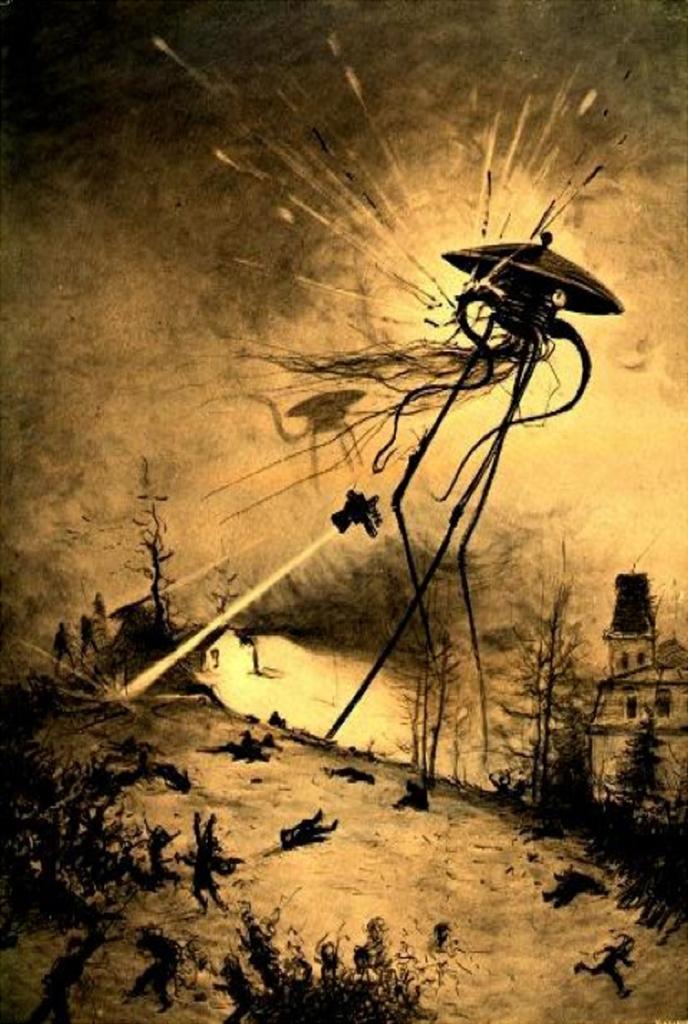Almost as soon as the new United States was created, it began expanding its imperial rule ever deeper into the continent, and that growth was inextricably linked to new visions of Christian mission. Yet even as that enterprise was getting under way, there appeared a savage critique of the whole idea of missions and missionaries, a text that still repays careful reading. As I will suggest, this barely-remembered critique also helps us understand another really famous book, and one you definitely will have heard of.
Protestant global missions began in earnest from the very end of the eighteenth century, with the creation of a number of missionary societies in both Britain and the United States. The American Board of Commissioners for Foreign Missions dates from 1810. But in this story, the adjacent year of 1809 also deserves commemoration, as it marked the appearance of a pioneering and hard-hitting tract against both missions and empire. I first came across this many years ago as I was writing my book Dream Catchers: How Mainstream America Discovered Native Spirituality (2004). It was easy enough to trace the long record of Euro-American denunciation of Native religion as savage, primitive, bloodthirsty, and actively diabolical, which preceded the later White romanticization of those same ideas. But it was really surprising to find what was in effect a defense of those Native ways at a very early point, and from a remarkable source.
Washington Irving and the Hypocrisy of European Conquest
In 1809, Washington Irving published his best-selling History of New York, one of the most important works of early national literature (you can find the full text easily here). Irving’s work was heavily satirical, and often very funny, and among the issues he addressed was the basic question of just how European powers had justified their conquest and settlement of the new lands (Book I, chapter v). This question was crucial, “And, indeed, until it be totally vanquished, and put to rest, the worthy people of America can by no means enjoy the soil they inhabit with clear right and title, and quiet, unsullied conscience.” Europeans, he suggested with tongue heavily in cheek, had clearly discovered a wholly uninhabited land. Well, not exactly uninhabited, because there were plenty of Indians already there, who bore “a marvelous resemblance to human beings.” Even so, wise Europeans soon proved that they were not really human, because they were “mere cannibals, detestable monsters, and many of them giants,” and worse, they lacked any sense of property, or of advanced agriculture:
All which circumstances plainly convinced the righteous followers of Cortes and Pizarro that these miscreants had no title to the soil that they infested—that they were a perverse, illiterate, dumb, beardless, black-seed—mere wild beasts of the forests and, like them, should either be subdued or exterminated.
Europeans prominently used religion to justify their conquests, and as Irving well knew, those missionary efforts had destroyed whole cultures, and caused a massive decline in Native populations. But as he quoted one missionary priest,
Can anyone have the presumption to say that these savage pagans have yielded anything more than an inconsiderable recompense to their benefactors, in surrendering to them a little pitiful tract of this dirty sublunary planet, in exchange for a glorious inheritance in the kingdom of heaven?
In 1494, Pope Alexander VI issued a Bull to legitimize the Iberian conquests in the New World, dressing imperial greed in the language of mission and evangelism.
Those arguments were familiar enough in Protestant Europe, and constituted the whole Black Legend of alleged Spanish brutality and Catholic hypocrisy. But this was where Irving made his really distinctive contribution to the indictment of empire. If you want to understand the conquests, he told his readers, just suppose it happened to you. How would you like it if some alien force crashed in on your existence and demanded you change all your ways, accepting some new religious system that was utterly incomprehensible to you. How would you like it?
The Lunatics’ Mission to Earth
Just suppose, said Irving, that the inhabitants of the Moon (literally, the Lunatics) had mastered the art of interplanetary travel, just as we today are beginning to learn use balloons. I will quote his passage at length, but among other things, do note the parody of imperial racial assumptions; the dehumanization of the colonized subjects; and above all, the ruthless satire of the language of mission and evangelization – how these aliens impose “the precepts of lunar philosophy.” As Irving’s Lunatics enforce a new religion on their subjects, in the process they suppress countless aspects of culture that they make no effort to understand. Like the Europeans in America, the Lunatics demoralize the Earth people with intoxicants – literally with moonshine – before exiling the few survivors to the planet’s most remote and barren areas:
To return, then, to my supposition—let us suppose that the aerial visitants I have mentioned, possessed of vastly superior knowledge to ourselves—that is to say, possessed of superior knowledge in the art of extermination—riding on hippogriffs—defended with impenetrable armor—armed with concentrated sunbeams, and provided with vast engines, to hurl enormous moonstones; in short, let us suppose them, if our vanity will permit the supposition, as superior to us in knowledge, and consequently in power, as the Europeans were to the Indians when they first discovered them. All this is very possible, it is only our self-sufficiency that makes us think otherwise; and I warrant the poor savages, before they had any knowledge of the white men, armed in all the terrors of glittering steel and tremendous gunpowder, were as perfectly convinced that they themselves were the wisest, the most virtuous, powerful, and perfect of created beings, as are at this present moment the lordly inhabitants of old England, the volatile populace of France, or even the self-satisfied citizens of this most enlightened republic.
Let us suppose, moreover, that the aerial voyagers, finding this planet to be nothing but a howling wilderness, inhabited by us poor savages and wild beasts, shall take formal possession of it, in the name of his most gracious and philosophic excellency, the Man in the Moon. Finding however that their numbers are incompetent to hold it in complete subjection, on account of the ferocious barbarity of its inhabitants, they shall take our worthy President, the King of England, the Emperor of Hayti, the mighty Bonaparte, and the great King of Bantam [in Java], and, returning to their native planet, shall carry them to court, as were the Indian chiefs led about as spectacles in the courts of Europe.
Then making such obeisance as the etiquette of the court requires, they shall address the puissant Man in the Moon in, as near as I can conjecture, the following terms:——
“Most serene and mighty Potentate, whose dominions extend as far as eye can reach, who rideth on the Great Bear, useth the sun as a looking glass, and maintaineth unrivaled control over tides, madmen, and sea-crabs. We, thy liege subjects, have just returned from a voyage of discovery, in the course of which we have landed and taken possession of that obscure little dirty planet, which thou beholdest rolling at a distance. The five uncouth monsters which we have brought into this august present were once very important chiefs among their fellow-savages, who are a race of beings totally destitute of the common attributes of humanity, and differing in everything from the inhabitants of the moon, inasmuch as they carry their heads upon their shoulders, instead of under their arms—have two eyes instead of one—are utterly destitute of tails, and of a variety of unseemly complexions, particularly of horrible whiteness, instead of pea-green.
“We have moreover found these miserable savages sunk into a state of the utmost ignorance and depravity, every man shamelessly living with his own wife, and rearing his own children, instead of indulging in that community of wives enjoined by the law of nature, as expounded by the philosophers of the moon. In a word, they have scarcely a gleam of true philosophy among them, but are, in fact, utter heretics, ignoramuses, and barbarians. Taking compassion, therefore, on the sad condition of these sublunary wretches, we have endeavored, while we remained on their planet, to introduce among them the light of reason and the comforts of the moon. We have treated them to mouthfuls of moonshine, and draughts of nitrous oxide, which they swallowed with incredible voracity, particularly the females; and we have likewise endeavored to instil into them the precepts of lunar philosophy. We have insisted upon their renouncing the contemptible shackles of religion and common sense, and adoring the profound, omnipotent, and all perfect energy, and the ecstatic, immutable, immovable perfection. But such was the unparalleled obstinacy of these wretched savages that they persisted in cleaving to their wives, and adhering to their religion, and absolutely set at nought the sublime doctrines of the moon—nay, among other abominable heresies they even went so far as blasphemously to declare that this ineffable planet was made of nothing more nor less than green cheese!”
At these words, the great Man in the Moon (being a very profound philosopher) shall fall into a terrible passion, and possessing equal authority over things that do not belong to him, as did whilome his holiness the Pope, shall forthwith issue a formidable Bull, specifying, “That whereas a certain crew of Lunatics have lately discovered and taken possession of a newly-discovered planet called the Earth; and that whereas it is inhabited by none but a race of two-legged animals that carry their heads on their shoulders instead of under their arms; cannot talk the Lunatic language; have two eyes instead of one; are destitute of tails, and of a horrible whiteness, instead of pea-green—therefore, and for a variety of other excellent reasons, they are considered incapable of possessing any property in the planet they infest, and the right and title to it are confirmed to its original discoverers. And, furthermore, the colonists who are now about to depart to the aforesaid planet are authorised and commanded to use every means to convert these infidel savages from the darkness of Christianity, and make them thorough and absolute Lunatics.” [my emphasis]
In consequence of this benevolent Bull, our philosophic benefactors go to work with hearty zeal. They seize upon our fertile territories, scourge us from our rightful possessions, relieve us from our wives, and when we are unreasonable enough to complain, they will turn upon us and say, “Miserable barbarians! ungrateful wretches! have we not come thousands of miles to improve your worthless planet? have we not fed you with moonshine! have we not intoxicated you with nitrous oxide? does not our moon give you light every night? and have you the baseness to murmur, when we claim a pitiful return for all these benefits?” But finding that we not only persist in absolute contempt of their reasoning and disbelief in their philosophy, but even go so far as daringly to defend our property, their patience shall be exhausted, and they shall resort to their superior powers of argument; hunt us with hippogriffs, transfix us with concentrated sunbeams, demolish our cities with moonstones; until having by main force converted us to the true faith, they shall graciously permit us to exist in the torrid deserts of Arabia, or the frozen regions of Lapland, there to enjoy the blessings of civilization and the charms of lunar philosophy, in much the same manner as the reformed and enlightened savages of this country are kindly suffered to inhabit the inhospitable forests of the north, or the impenetrable wilderness of South America.
How would American readers in 1809 like to be at the receiving end of a missionary imperialism that would eliminate their belief systems, while justifying the erasure of their race? Were not all such missionary ventures of their nature intolerable and, well, lunatic?
To be clear, Irving is not attacking the idea of mission as such: if Moon people wish to share their Lunatic Philosophy through peaceful argument, they are presumably welcome to do so. The problem is with missionary imperialism, or with mission as an arm of empire, in which the evangelism ultimately depends on the armed force of a secular authority which conquers or dominates the area. That would certainly be the case with the US’s own Native peoples. Overseas, this would apply to societies where the technological gulf with Europe and the US was enormous, and which would tempt the greed of predatory empires. Such powers were all too willing to use supposed threats to missionaries as an excuse to attack or annex non-Christian lands. In such a world, it would be very difficult indeed to contemplate mission except as a form of imperial coercion. The imbalance of power was just too massive.
From Washington Irving to H. G. Wells
Although Irving’s satire is largely forgotten today, the scenario he describes sounds very familiar indeed, from a different source. Is this not exactly the framework of H. G. Wells’ The War of the Worlds, first published in serial form in 1897? Observing the arrogant expansion of European powers in Africa, Wells decided to turn the tables, to ask his readers how those White races would feel if someday soon an alien race appeared in their home countries, armed with astonishing scientific weapons, which are just as incomprehensible and terrifying to us as Gatling guns were to Native Africans. It is precisely the Irving scenario, although the conquerors come not from the Moon but from Mars. Echoing Irving’s account of those vastly superior lunar minds, Wells’s Martians are likewise “intelligences greater than man’s … minds that are to our minds as ours are to those of the beasts that perish, intellects vast and cool and unsympathetic.” And they do indeed use ray guns and radiation weapons, just as Irving had described: they “transfix us with concentrated sunbeams, demolish our cities with moonstones.”
Wells’s Martians are not interested in converting Earthlings to any kind of intellectual system, but the effects are the same as in Irving. In the modern world, Wells believed, religious missions were hard to distinguish from genocide, literal or cultural. As he wrote a few years later in A Modern Utopia (1905):
Now there are various ways of exterminating a race, and most of them are cruel. You may end it with fire and sword after the old Hebrew fashion; you may enslave it and work it to death, as the Spaniards did the Caribs; you may set it boundaries and then poison it slowly with deleterious commodities, as the Americans do with most of their Indians; you may incite it to wear clothing to which it is not accustomed and to live under new and strange conditions that will expose it to infectious diseases to which you yourselves are immune, as the missionaries do the Polynesians; you may resort to honest simple murder, as we English did with the Tasmanians; or you can maintain such conditions as conduce to “race suicide,” as the British administration does in Fiji.
As a very literate man of his time, Wells would certainly have read Irving’s work, which was extremely well known. Around this same time, he borrowed Irving’s story of Rip Van Winkle as the inspiration for his novel When the Sleeper Wakes (1899). So did he borrow or appropriate Irving’s “Lunatic” passage as a sketch for The War of the Worlds? Being a man of science, Wells knew that the Moon as it was understood in his day was a dead world that could not sustain life or civilization. But who knew about Mars, where alleged “canals” had been identified in the 1870s, presumably the work of some kind of civilization? Hence Irving’s Lunatics were transformed into Wells’s Martians. Even in the first paragraph of War of the Worlds, Wells offers what might be a wry echo of Irving’s anti-missionary critique when he suggests that “terrestrial men fancied there might be other men upon Mars, perhaps inferior to themselves and ready to welcome a missionary enterprise.” I am in no sense a Wells specialist, but surely, that linkage seems highly likely.
Whatever the influence, Irving’s Man in the Moon story poses questions about the missionary endeavor that must still be troubling.
















